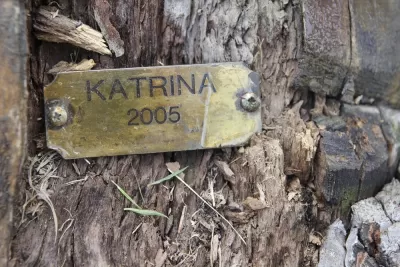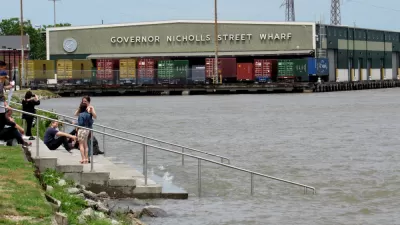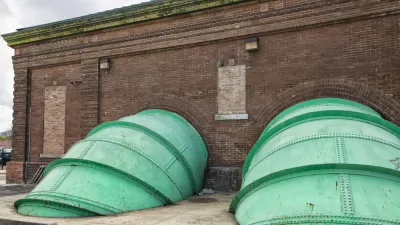In an underreported fact, it has rained every day since April 1 in New Orleans this year. The city is struggling to deploy stormwater infrastructure, however, and flooding overwhelmed drainage again this month, on the cusp of hurricane season.

Jim Gabour reports on the sorry state of New Orleans stormwater infrastructure—12 years after Hurricane Katrina and as the height of hurricane season approaches again.
Hundreds of miles of new and reinforced levees have been built since Hurricane Katrina, and the "Army Corps of Engineers built three huge new multi-million-dollar pumps on the Lakefront, so that when the engineers close the floodgates to keep the lake waters out, the pumps can be activated to keep excessive water from overwhelming the system," according to Gabour.
Yet, as spring rains have given way to summer showers and hurricane season arrives, residents and officials are realizing that the city is having trouble draining stormwater when rain falls on the city. Gabour credits some of this problem to the loss of trees after Katrina, but after floods on August 5, 2017, it's become clear that "even if the entire pumping system had been operating at maximum capacity […] the rain would still have overwhelmed the system." The system wasn't operating at full capacity on August 5, however, because "eight of the city’s pumps had been out of service before a drop of rain fell Saturday." In fact "[s]ubsequent investigation found that of 67 pumps on the East Bank of the city, just 58 were 'functional in some form,'" according to Gabour.
The fallout from the stormwater infrastructure operations failures on August 5 led Mayor Mitch Landrieu to fire all the top administrative personnel at the Sewage and Water Board on August 8.
FULL STORY: New Orleans under water: 10 years after Katrina, officials can't get it right

Maui's Vacation Rental Debate Turns Ugly
Verbal attacks, misinformation campaigns and fistfights plague a high-stakes debate to convert thousands of vacation rentals into long-term housing.

Planetizen Federal Action Tracker
A weekly monitor of how Trump’s orders and actions are impacting planners and planning in America.

Chicago’s Ghost Rails
Just beneath the surface of the modern city lie the remnants of its expansive early 20th-century streetcar system.

Bend, Oregon Zoning Reforms Prioritize Small-Scale Housing
The city altered its zoning code to allow multi-family housing and eliminated parking mandates citywide.

Amtrak Cutting Jobs, Funding to High-Speed Rail
The agency plans to cut 10 percent of its workforce and has confirmed it will not fund new high-speed rail projects.

LA Denies Basic Services to Unhoused Residents
The city has repeatedly failed to respond to requests for trash pickup at encampment sites, and eliminated a program that provided mobile showers and toilets.
Urban Design for Planners 1: Software Tools
This six-course series explores essential urban design concepts using open source software and equips planners with the tools they need to participate fully in the urban design process.
Planning for Universal Design
Learn the tools for implementing Universal Design in planning regulations.
planning NEXT
Appalachian Highlands Housing Partners
Mpact (founded as Rail~Volution)
City of Camden Redevelopment Agency
City of Astoria
City of Portland
City of Laramie





























